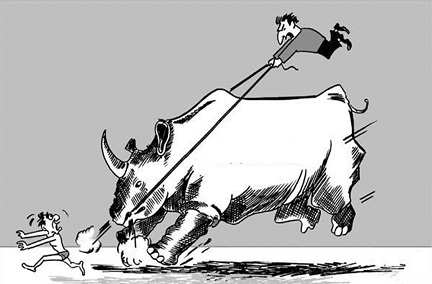
We've all see a bunch of crazy stuff play out in crypto.
However, how many times do you recall a crypto network that grew beyond the bounds of the developers and resulted in other parties being in control of the platform? As far as I'm aware this is a very short list. Most of the time this happening results in systemic failure of the platform rather than the community being in charge. Other times it just results in a new centralized boss. Neither of these outcomes is relevant to the topic at hand.
So how many times has it happened?
First example might be Bitcoin itself, but Bitcoin didn't exactly grow beyond the scope of the developer, did it? Instead the developer just vanished and remains anon to this day. If we look at the upgrades and infrastructure changes that Bitcoin has made over more than a decade, we can see that the network is still pretty much operating as intended with very little changes made to the core code. Hell, the community can't even agree to increase the blocksize. Luckily the stagnant codebase is a feature rather than a bug. We can depend on Bitcoin being... dependable. It's unchanging nature is an advantage we can rely on, and the chance of another big upgrade like Schnorr Signatures seems pretty unlikely considering how pissed off purists are that this tech was used to put NFTs on-chain. Beware the unintended consequences of core code changes.
Best Example is @Dan Larimer
- He created BitShares and it didn't pan out like he wanted.
- He created Steem and @Ned issued a ridiculous ninjamine.
- He created EOS and the RAM debacle was a comical nightmare.
Every project that @dan has created has been technically sound with a lot of hype out the door. But then somehow it grows beyond his control and a bunch of greedy whales start doing greedy whale things and fucking everything up.
While this sounds bad and just a list of failures on his resume... it's actually solid proof that projects that Dan builds actually have a chance at success, while all the other bullshit out there is bullshit.
Want to know the reason why this doesn't happen to anyone else?
Because the dev team unilaterally controls everything and then masquerades it all as "decentralization".
- They create insane premines that put them in charge forever.
- The smart-contracts they create can only be controlled, modified, and issued by them.
- Over 95% of all cryptocurrencies out there are centralized securities.
- It is known.
If a network can not be money attacked then it isn't decentralized.
This sounds very counterintuitive, but it is absolutely true. It wouldn't matter how much money a random billionaire threw at the vast majority of cryptocurrencies. The dev team that built it would still be in charge after the tokens were bought and the price was pumped.
POW coins can only be money attacked by spending money on mining equipment. This is the advantage of POW coins in that the entities that control the network aren't necessarily the ones that have any stake. It's a completely different resource. This makes POW coins inherently more decentralized than their proof-of-stake counterparts.
APOW chain that becomes corrupted by bad-actors can fork to a new hashing algorithm and eliminate all the money the attackers spent on ASIC machines without even having to 'steal' money directly. POS depends on a good distribution of tokens while POW does not. This is a very important distinction.
Steem was a very weird edge case.
Steem was money attacked... but in a very underhanded way in which a controlling stake in the network was sold under the table. Tokens that were promised "for development" were rug-pulled right out from under us. If we're being honest this was the obvious outcome because a premine is not necessary to fund development. It can only be used for stupid bullshit at worst and absolutely nothing at best. It doesn't make sense to premine a token when you can just print money out of thin air to do it in real-time like the @hive.fund using actual community consensus.
And now we have Hive.
And Hive seems pretty good so far. Although it is certainly more centralized than it appears to be on paper because of the dreaded Sybil Attack. We have no idea how many whale accounts are actually controlled by the same person. But so far it's been going pretty well so I'll assume we've reached a "good-enough" scenario of power balance.
- First Dan lost control of Steem.
- Then Ned lost control of Steem.
- Then Sun lost control of the Steem community.
What a wild ride.
How many other networks can boast about such drama? Of course you might be thinking that drama is bad and pretty bearish, but again the counterintuitive opposite is true. A network that has no drama most likely has no drama because a single overriding central authority assures harmony and direction. Can't have drama if only one entity has power. Power struggles are a clear sign that actual decentralization has occurred.
So what about Vitalik?
Well we can see that the switch the proof of stake has not been all sunshine and rainbows. People are calling this change in code an "obvious" conversion to an unregistered security. However... how can something go from not being a security for years to suddenly being a security now? That's not something that's happened in the history of ever, and securities law hasn't the slightest clue how to handle something like that, so the SEC just makes up the rules as they go.
The switch to proof of stake obviously puts the Ethereum Foundation in charge of the network, so while Vitalik hasn't yet lost control of his baby, he certainly seems to be losing control of the narrative and any potential decentralization ETH used to have. That being said, ETH has the most developers of any network, and there is a magnitude of potential energy stored up.
What I mean by this is that ETH is almost guaranteed to fracture into more sub-communities that finally get fed up with the current state of centralization (it's obviously going to escalate over time to absurd levels). Even more EVM chains will pop up with the Foundation's premine cut out of the equation.
This will of course create a lot of turbulence and FUD with ETH and EVM in the short term, but it will likely all work out in the end which is something the doomsayers just don't understand; they can only see the threats rather than the responses to the threats.
Anyone in the Hive community knows that escaping imperialism is not only possible, but probable when a group of like-minded individuals gets pushed hard enough. ETH could fracture into a dozen different factions and every one of those factions would still be bigger than the Hive network. That's how big ETH is. Consensus is no trivial matter, even though it is constantly trivialized.
Conclusion
Losing control of the network you built is the most obvious signal that decentralization is possible. Most "cryptocurrencies" that get launched do not have this ability, and are thus inherently centralized. Power struggle drama is not a signal of failure, but rather one of success.
Keep this in mind as we approach this epic shitstorm of regulatory overreach that's about to rain down on everyone's heads. Regulation creates the force and friction needed to push communities to eliminate their associated premines and free themselves from the Foundations that fathered them.
This is one of the reasons I'm so grateful to be on Hive right now. We've already handled this issue to a large degree, and another money attack from the outside will surely make us all rich beyond our wildest dreams. Of course that won't matter much if we lose our community (just a consolation prize), but I think we can have our cake and eat it too should it happen again (but I doubt that it will). This puts us way ahead of a curve that most other communities don't even realize exists. The struggle is real, and they will learn the hard way just like we did. All we can do is point them in the right direction.
Posted Using LeoFinance Beta







